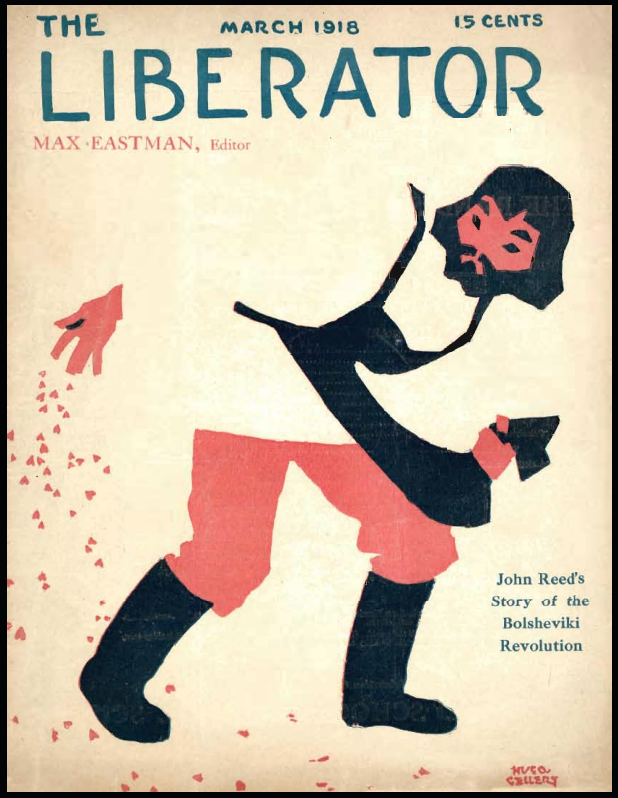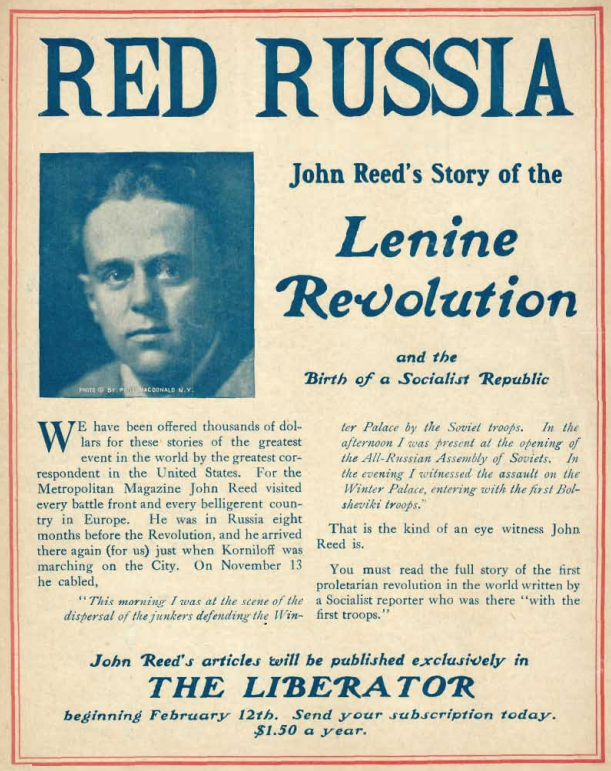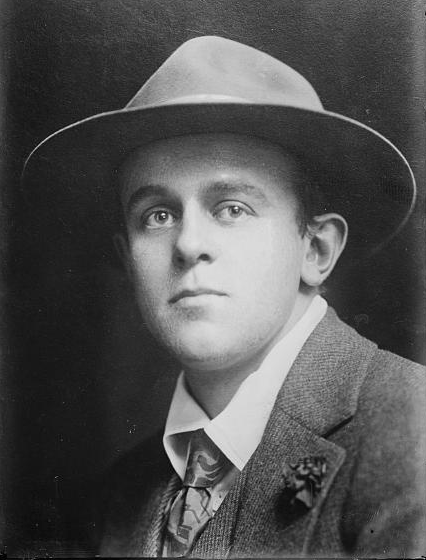In the relations of a weak Government
and a rebellious people
there comes a time when every act of the authorities
exasperates the masses,
and every refusal to act excites their contempt.
-Jack Reed
Hellraisers Journal, Saturday March 16, 1918
From The Liberator: John Reed on the Russian Revolution
Correspondent John Reed was in Russia with his wife, Louise Bryant, during the amazing events of October and November 1917. In the latest edition of The Liberator is published Reed’s account of what he witnessed, and which we republish, in part, below:
RED RUSSIA-
The Triumph of the BolshevikiI.
THE real revolution has begun. All the swift events of the last eight crowded months–the sudden debacle of Czarism in February, the brief inglorious attempt of Miliukov to establish a safe and sane bourgeois republic, the rise of Kerensky and the precarious structure of hasty compromise which constituted the Provisional Government–these were merely the prologue to the great drama of naked class-struggle which has now opened. For the first time in history the working-class has seized the power of the state, for its own purposes–and means to keep it.
Today the Bolsheviki are supreme in Russia. The ominous onward march of Kaledine, self-proclaimed military dictator and restorer of middle-class order, has stopped–his own Cossacks are turning against him. Yesterday Kerensky, after his defeat and the surrender of his staff at Galchina, fled in disguise. The news has just come that Moscow, after a bloody battle that wrecked the Kremlin and smashed thousands of lives, is undisputedly in the possession of the military Revolutionary Committee. As far as anyone can see, there is no force in Russia to challenge the Bolshevik power. And yet, as I write this, in the flush of their success, the new-born revolution of the proletariat is ringed round with a vast fear and hatred.
Last night two thousand Red Guards–the proletarian militia organized and armed by Trotzky just before the final clash–swung down the Zagarodny in triumph. Ahead a military band was playing–and never did it sound so appropriate–the Marseillaise. Blood-red flags drooped over the dark ranks of the marching workers. They were going to meet and welcome home to “Red Petrograd” the saviors of the new proletarian revolution–the troops who had just fought so desperately and so successfully against Kerensky and his Cossacks. In the bitter dusk they tramped, singing, men and women, their tall bayonets swinging, through streets faintly lighted and slippery with mud. And as they marched they passed always between crowds that were hostile, contemptuous, fearful.
The proletarian revolution has no friends except the proletariat. The bourgeoisie–business men, shop-keepers, students, land-owners, officers, political office holders and their fringe of clerks and servants and hangers-on, are solidly in opposition to the new order. The moderate Socialist parties–though they may find themselves forced by circumstances to combine with the Bolsheviks–hate them bitterly. But these elements are so far powerless. Their military strength is represented only by part of the Cossacks, and the Junkers–cadets of the Officers Schools. While on the side of the Bolsheviks are ranged the whole rank and file of the workers and the poorer peasants; and the soldiers and sailors are with and of them. On one side the workers, on the other side, everybody else. For the moment the cleavage has all the clear and beautiful distinctness of familiar theory…
And at this date [according to Russian calendar, thirteen days earlier than ours]–I am writing Nov. 4–the workers are in complete control. No one can know what the next few days may bring forth. If they can persuade the other Socialist parties to join with them in accomplishing their gigantic immediate program of Bread, Peace and Land for the Peasants, this proletarian government will probably last until the Constituent Assembly–and after that, in history, a pillar of fire for mankind forever.
[…..]
II. The True Revolution
[…..]
At the meeting of the Petrograd Soviet in Smolny, the night of October 17th, Trotsky branded the assertions of the bourgeois press that the Bolsheviks contemplated armed insurrection as “an attempt of the reactionaries to discredit and wreck the Congress of Soviets…”
[He declared:]
The Petrograd Soviet has not ordered any demonstration in the streets. When it will be necessary we will do so, and we are sure we will be supported by the workers and the Petrograd garrison…They (the Government) are preparing a counter-revolution; and we will answer with an offensive which will be merciless and to the end!
An Interview with Trotzky
That very day Trotsky gave me an interview about the projects of the new power–the “dictatorship of the proletariat”– which Volodarski had described to me as being in form “a loose government, sensitive to popular will, giving local forces full play.” He said:
The Provisional Government is absolutely powerless. The bourgeoisie is in control, but this control is masked by a fictitious coalition with the moderate parties. Now, during the revolution, one sees revolts of peasants who are tired of waiting for their promised land, and all over the country, in all the toiling classes, the same disgust is evident. The domination of the bourgeoisie is only possible by civil war. The Kornilov method is the only way by which the bourgeoisie can dominate. But it is force which the bourgeoisie lacks…The army is with us. The conciliators and pacificators, Social-Revolutionists and Mensheviks, have lost all authority–because the struggle between the peasants and the landlords, between the workers and the bankers, between the soldiers and the Kornilovist officers, has become more bitter, more irreconcileable than ever. Only by the struggle of this popular mass, only by the victory of the proletarian dictatorship, can the revolution be achieved and the people saved! The Soviets are the most perfect representatives of the people–perfect in their revolutionary experience, in their ideas and objects. Based directly on the army in the trenches, the workers in the factories, and the peasants in the fields, they are the backbone of the Revolution.
They have tried to create a power disdaining the Soviets, and they have created only powerlessness. Counter-revolutionary schemes of all sorts organize now in the corridors of the Council of the Russian Republic. The Cadet party represents the counter-revolution militant. On the other side, the Soviets represent the cause of the people. Between the two camps there are no serious groups. It is the inevitable lutte finale. The bourgeois counter-revolution organizes all its forces and waits for a moment to attack us. Our answer will be decisive. We will finish the work scarcely begun in February, and advanced during the Kornilov affair…
He described to me how the new government would he composed; instead of a ministry, the different departments of the state would be directed by a series of collegia, headed by titulary commissars, who would be responsible to the Central Executive Committee of the All-Russian Soviets–the new parliament. I asked about the new government’s foreign policy.
[Said Trotsky:]
Our first act will be to call for an immediate armistice on all fronts, and a conference of the peoples to discuss democratic peace terms. The quantity of democracy we get in the peace settlement depends upon the quantity of revolutionary response there is in Europe. If we create here a government of the Soviets, that will be a powerful factor for immediate peace in Europe; for this government will address itself immediately and directly to the peoples, over the heads of their governments, proposing an armistice. At the moment of the conclusion of peace the pressure of the Russian Revolution will be in the direction of: no annexations, no indemnities, the rights of peoples to dispose of themselves, and a Federated Republic of Europe.
At the end of this war I see Europe recreated, not by diplomats, but by the proletariat. The Federated Republic of Europe–the United States of Europe–that is what must be. National autonomy no longer suffices. Economic evolution demands the abolition of national frontiers. If Europe is to remain in national groups, then Imperialism will recommence its work. Only a Federated Republic can give peace to Europe and to the world.
He smiled, that singularly fine and somewhat melancholy smile of his.
But without the action of the European masses, these ends cannot be realized-now.
It is fashionable among the bourgeoisie to speak of the Bolshevik coup d’état as an “adventure.” Adventure it is, and one of the most splendid mankind ever embarked on, sweeping into history at the head of the toiling masses, and staking everything on their vast and simple desires. Peace, land, bread. Why not? Already the machinery was created by which the land of the great estates could be taken over and distributed to the peasants, each according to his powers. Already the factory shop committees were ready to put into operation workmen’s control of industry. The different nationalities of Russia were all ready for months to assume the administration of their own people. In every village, town, city, district and government, Soviets of Workmen’s, Soldiers’ and Peasants’ Delegates were prepared to assume the local powers of government. Liberate the local forces of Russia-how simple, and how tremendous! As for peace–well unless all signs lied, the peoples of the world were sick of and disillusioned with the War…What it meant was simply the liberation of the local forces of the world!
[…..]
III.
[…..]
Working Class Assumes Power
Tuesday morning, the 24th, the people of Petrograd awoke to find the city plastered with proclamations signed “Military Revolutionary Committee of the Petrograd Soviet of Workmen’s and Soldiers’ Delegates”:
To the Population of Petrograd. Citizens! Counter-Revolution has raised its criminal head. The Kornilovtsi are mobilizing their forces in order to crush down the All-Russian Congress of the Soviets and break up the Convention of the Constituent. At the same time the pogromists may attempt to call upon the people of Petrograd for trouble and bloodshed. The Petrograd Soviet of Workmen’s and Soldiers’ Delegates takes upon itself the guarding of revolutionary order in the city against counter-revolutionary and pogrom attempts.
The Petrograd garrison will not allow any violence or disorders. The population is invited to arrest hooligans and Black Hundred agitators and take them to the Soviet commissars at the nearest barracks. At the first attempt of the dark forces to make trouble on the streets of Petrograd, whether robbery or fighting, the criminals will be rubbed away from the face of the earth!
Citizens! We call upon you to maintain complete quiet and self-possession. The cause of order and Revolution is in strong hands.
At Smolny that night meeting of the old Central Executive Committee of the All-Russian Soviets–its last–to welcome the delegates to the new Convention. Futile resolutions against the demonstration, in favor of complete submission to the Provisional Government….At the Council of the Republic, Kerensky thundered that the Government would, suppress all uprisings mercilessly….At the Winter Palace heated conferences, expulsion of impotent Colonel Polkovnikov as Commander of Petrograd, appointment of a special committee, headed by Kishkine, to reestablish order….Call to the Junkers of Pavlovsk, of Tsarkoe, to come–and replies that they dare not, Bolshevik troops in the way….Calls to the Cossacks–who reply that they will not come out unless they are supported by infantry….
At midnight members of the Pavlovsk regiment, who have secreted themselves in the meeting-room of the General Staff, overhear the plans that are being made to arrest the Bolshevik leaders, capture the Smolny and disperse the All-Russian convention. Immediately they post guards at all the entrances to the Staff, begin arresting officers and members of the Ministry, take them to Smolny–where no one knows what to do with them. Released with apologies. And then, two hours later, Junkers seizing the principal points of the city, the Military Revolutionary Committee gets into action. Ministers and Staff officers to be arrested, armored cars ordered out to hold the street-corners. Bolshevik troops sent to seize the State Bank, the Telephone Station, drive the Junkers out of the Telegraph Station, and draw a cordon around the Winter Palace….But Kerensky has already fled.
The masses are in power…..And on the morning of October 31, after the defeat of Kerensky’s Cossack army, Lenine and Trotzky sent through me to the revolutionary proletariat of the world this message:
Comrades! Greeting from the first proletarian republic of the world. We call you to arms for the international social revolution.
From the Buffalo Socialist New Age of February 23, 1918:
Bolsheviki Defy U. S. Government
—–Name American Under Indictment as Consul General
and Will Retaliate on Ambassador Francis
if He is Prosecuted.
—–
Stockholm, Feb. 18.-John Reed, the writer, who is under indictment in the United States for alleged seditious activities, has arrived here from Petrograd, on his way to New York to take up the post of consul-general in that city under a Bolshevik commission. Reed told the Associated Press correspondent the following story of how he came to be appointed:
“Desiring to take a quantity of notes and other written matter to America without interference by censorship, Reed visited Foreign Minister Trotzky and asked to be appointed a Bolshevik courier. Trotzky told him the government would do better than that and make him consul-general in New York.
Trotzky is said to have told Reed that if any attempt were made by the American authorities to prosecute him under the pending indictment the Bolsheviki would retaliate on Ambassador Francis. Reed’s mission is considered, therefore, in the nature of a test to see whether the United States dare defy Trotzky.”
[Photograph added.]
SOURCES
The Liberator
(New York, New York)
-March 1918
(Also source for images of cover & back of issue.)
http://www.marxisthistory.org/history/usa/culture/pubs/liberator/1918/0300-liberator-v1n01-opt.pdf
Can also be found at John Reed Internet Archive:
https://www.marxists.org/archive/reed/1918/red-russia1.htm
The New Age
(Buffalo, New York)
-Feb 23, 1918
https://www.newspapers.com/image/354187518/
IMAGE
John Reed, ab 1915, LOC
http://www.loc.gov/pictures/item/2014699295/
See also:
Tag: John Reed
https://weneverforget.org/tag/john-reed/
John Reed-Internet Archive
1914-1921
https://www.marxists.org/archive/reed/index.htm
John Reed, Witness to Revolution
-by Tamara Hovey
Crown, 1975
https://books.google.com/books?id=AA45AQAACAAJ
Six Red Months in Russia
by Louise Bryant
NY, 1918
https://archive.org/stream/bryant-sixredmonthinrussia#page/n5/mode/2up
Red Russia by John Reed
-Consul in New York State for
The Russian Peoples’ Government
Workers’ Socialist Fed, 1919
https://wdc.contentdm.oclc.org/digital/collection/russian/id/2066



